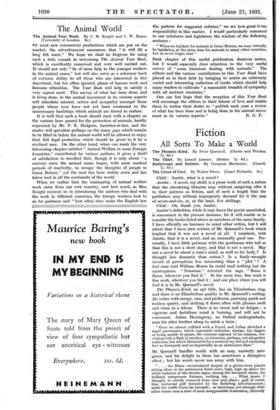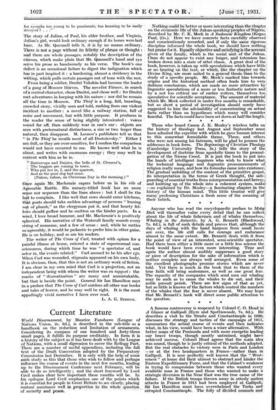Fiction
All Sorts To Make a World
The Thief. By Leonid Leonov. (Seeker. 7s. 6d.) The Cross of Carl. By Walter Owen. (Grant Richards. 5s.)
Child : Auntie, what is a novel ?
Auntie : A novel, my child, is a prose work of such a nature that the circulating libraries may without misgiving offer it to their patrons as fiction, and of such a length that the
publishers may without impropriety. demand for it the sum
of seven-and-six, or, at the least, five shillings. Child : Oh, thank you, Auntie.
Auntie's definition, while it may leave the purist unsatisfied, is convenient in the present instance, for it will enable us to
consider the books listed above as members of the same family. I have officially no business to mind other critics,. but I will admit that I have seen notices of Mr. Quennell's book which implied that it was not a novel at all. I maintain, with Auntie, that it is a novel, and an unusually good one. Per- sonally, I have little patience with the gentlemen who tell us that this is not a short story, and that is not .a novel. May not a novel be about a man's mind, as well as his body ? Is thought less dramatic than action ? Is a finely-wrought record of perceptions less interesting than a " plot " ? A fool once told William Morris he could read nothing but the masterpieces. " Nonsense," retorted the sage, " flame is flame, wherever you find it." In the same way, fine work is fine work, wherever you find it : and one place where you will
find it is in Mr. Quennell's novel.
The Phoenix-Kind, an apt title, has an Elizabethan ring, and there is an Elizabethan quality in Mr. Quennell's writing.
He writes with energy, care, and profusion, pursuing quick and restless quarry, and striking it down often with phrases swift and clean as a falcon. There is no sweat and no fatigue : a vigorous and fastidious mind is burning, and will not be consumed. Julian Hemingway, an Oxford undergraduate, runs his elder brother along to catch a train :
" Once we almost collided with a friend, and Julian sketched a rapid pantomime, which expressed confusion, dismay, his chagrin at being unable to pause, the extreme urgency of his mission, con- cluding with a flash of mockery, in intention, perhaps, not altogether malicious, but which illuminated for a moment my red and streaming face as brusquely and as impartially as an ahunuuum flare."
Mr. Quennell handles words with an easy, masterly arro- gance, and his delight in them has sometimes a disruptive effect ; but his words never run away with him.
" . . the Blues—accumulated despair of a ghetto-born pianist sitting alone in his portentous hotel suite, high, high np above the white radiance of the electric signs, among the brocaded chairs, the brilliant sumptuous fixtures, nothing his. . . . What music, I thought, so utterly removed from time and place ; gulf of ennui, blue nocturnal gulf threaded by the flickering advertisements ; while the traffic hums far beneath ; so lascivious, yet through what other music runs a note of such unappeasable frustration, threnodj
nymphs for nymphs tob young to be passionate, 'foe knowing to be easily deCoyed ? . . ."
The story of Julian, of Paul, his elder brother, and Virginia, Julian's girl, would look ordinary enough if its bones were laid bare. As Mr. Quennell tells it, it is by no means ordinary. TlOre is not a page without its felicity of phrase or thought : arid there are whole passages, notably the description of the
cinema, which make plain that Mr. Quennell's hand and eye serve his prose as handsomely as his verse. The book's one defect is an occasional failure to digest the indignation which has in part inspired it : a hardening, almost a stridency in the Wilting, which pulls certain passages out of tone with the rest.
From being a soldier, Dmitri Vekshin had become the leader ors gang of Moscow thieves. The novelist Firssov, in search ofa central character, chose Dmitri, and chose well : for Dmitri met adventures in keeping with his nature : nor did he remain all the time in Moscow. The Thief is a long, full, braWling, crowded story, vividly seen and told, rushing from one violent incident to another : a novel like a railway station, full of noise and movement, but with little purpose. It produces in the reader the sense of being slightly intoxicated : voices sound far off, then suddenly roar in one's ear : objects are seen with preternatural distinctness, a size or two larger than natural, then disappear. M. Leonov's publishers tell us that " in The Thief he recalls most of all Dostoievsky." Either I
am dull, or they are over-sensitive, for I confess the comparison would not have occurred to me. He knows well what he is about, and writes with enormous energy ; they may well be content with him -as he is;
!" Buttercups and Daisies, the bells of St. Clement's, The beggars are coining to town. Who' put her in, I; said the sparrow, And so the poor dog had none. (Tishoo, tiahoo, on Christmas Day in the morning.) "
Once again Mr. 111ackeniie capers before us in- his role of Agreeable Rattle. his nursery-titled book has no more sense nor sequence than the lines above : but. I shall be the lalt to complain. I like well that cows should enter kitchens, tliat goats should take sudden advantage of persons " leaning out of plumb," as the clergyman put it, and that hearty fel- loWs should guffaw and be smitten on the hinder parts. In a word, I love broad humour, and Mr. Mackenzie's is positively spherical. His narrative of the Waterall family sounds every string of nonsense, and a few of sense : and, while he rattles so=agreeably, it would be pedantic to prefer him in other guise.
He is on holiday, and so are his readers.
.The writer of The Cross of Carl, treated with opium for a
painful illness at home, entered a state of supernormal con- sciousness, during which time he was " a spectator of, and actor in, the 'events related." Carl seemed to be his alter ego. When Carl was wounded, stigmata appeared on his own body.
It is obvious, then, that this is not an ordinary work of fiction. I am clear in my own mind that Carl is a projection, not an independent being with whom the writer was en rapport : the marks of " dramatisation " are many and unmistakable, but that is beside the point. General Sir Ian Hamilton says in.a preface that The Cross of Carl outdoes all other war books and tales of horror, and he may well be right. It is the most appallingly vivid narrative I have ever read.
L. A. G. STRONG.







































 Previous page
Previous page